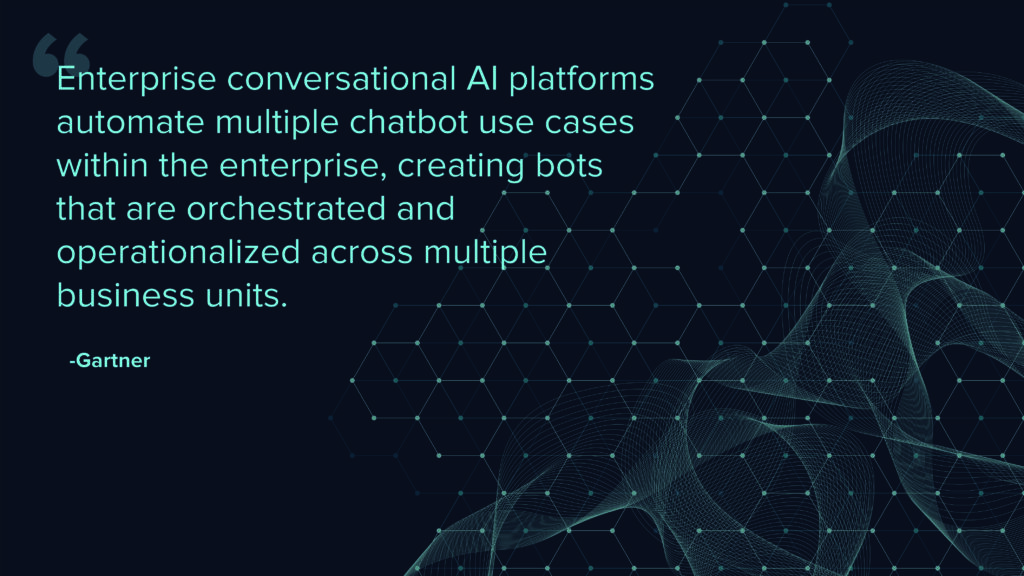
“In a typical leasing office, the phones ring constantly,” Preston wrote. “Agents spend most of the workday speaking to prospects, who often ask the same litany of questions. But with Brenda fielding calls, the phone lines were silent and agents were free to attend to other tasks.”
As companies seek to maintain high productivity levels with limited human resources, conversational AI solutions like Brenda are growing in prevalence and popularity. By 2026, Gartner predicts that one out of every 10 agent interactions will be automated, and conversational AI deployments will lower contact center labor costs by $80 billion worldwide.
If you’re considering whether your company could benefit from this type of technology, here are the answers to some key questions you might have about enterprise conversational AI platforms, how they function, and how they can potentially prove advantageous for your organization.
1. What is enterprise conversational AI?
Gartner defines the technology as “software applications used to build, orchestrate and support the development of multiple use cases of conversational automation, while targeting multiple roles within the enterprise.” This type of artificial intelligence allows a company to strategically automate communications across the organization.
Conversational AI imitates interactions with actual humans with the following technical capabilities and features, according to Deloitte Digital:
- Machine learning
- Natural language processing (NLP)
- Fulfillment, or pulling data from online resources or databases, running conditions, and communicating with the Dialog Manager
- Voice-optimized response capabilities and emotiveness
- Ability to discern user intent
- Ability to recognize entities (e.g., dates and times)
- Text-to-speech conversion capabilities, including emphasis, inflection, and accents
- Context awareness to maintain naturally flowing conversations
2. Are the terms ‘enterprise conversational AI’ and ‘conversational AI’ interchangeable?
Enterprise conversational AI is a specific type of solution that falls within the broader category of conversational AI. Gartner specifies that enterprise conversational AI “focuses on the needs of larger enterprises by targeting multiple use cases, modalities of conversation (i.e., speech, chat, text messaging and email) and the ability to operationalize within the enterprise.”
3. What is the difference between a chatbot and a conversational AI platform?
Conversational AI platforms are commonly referred to as chatbots, according to Gartner. However, there are different kinds of chatbots. Rule-based bots utilize decision trees and can only provide pre-programmed responses; they don’t learn from interactions. On the other hand, AI chatbots can learn from experience and craft customer profiles, according to Instabot. Enterprise conversational AI falls under the category of AI-powered chatbots.
4. What are the main benefits of enterprise conversational AI?
Particularly at a time when many organizations are short-staffed and looking to contain costs, artificial intelligence has enormous potential to tackle mundane tasks and lighten the load for human employees, as Preston mentions in her article.
Additionally, with all of the technologies listed above, conversational AI can offer personalized customer service and enhance the customer experience (CX), according to Deloitte.
Some other notable advantages of conversational AI include providing customer service outside of typical business hours and in multiple languages, according to the Hootsuite blog entry “What Is Conversational AI: A 2023 Guide You’ll Actually Use.”
5. What is the best enterprise conversational AI solution?
If you’re interested in finding market leaders in the enterprise conversational AI space, the Gartner Magic Quadrant for Enterprise Conversational AI Platforms is one reliable source of information. However, the ideal solution will vary depending on business size, industry, short- and long-term goals, integration with other applications, and other factors.
Our trusted technology advisors can identify the best enterprise conversational AI solution for your organization based on an assessment of your current situation. We can leverage extensive technology knowledge, a vast partner network, and advanced tools to generate objective comparison matrices and streamline the shopping-around process. Our team can arrange demos and assist with negotiations once you select a supplier. On top of all that, working with us won’t cost you more than going directly to the provider because of our price parity guarantee.
Get started today by calling 877-599-3999 or emailing sales@stratospherenetworks.com to schedule a consultation with one of our advisors.



